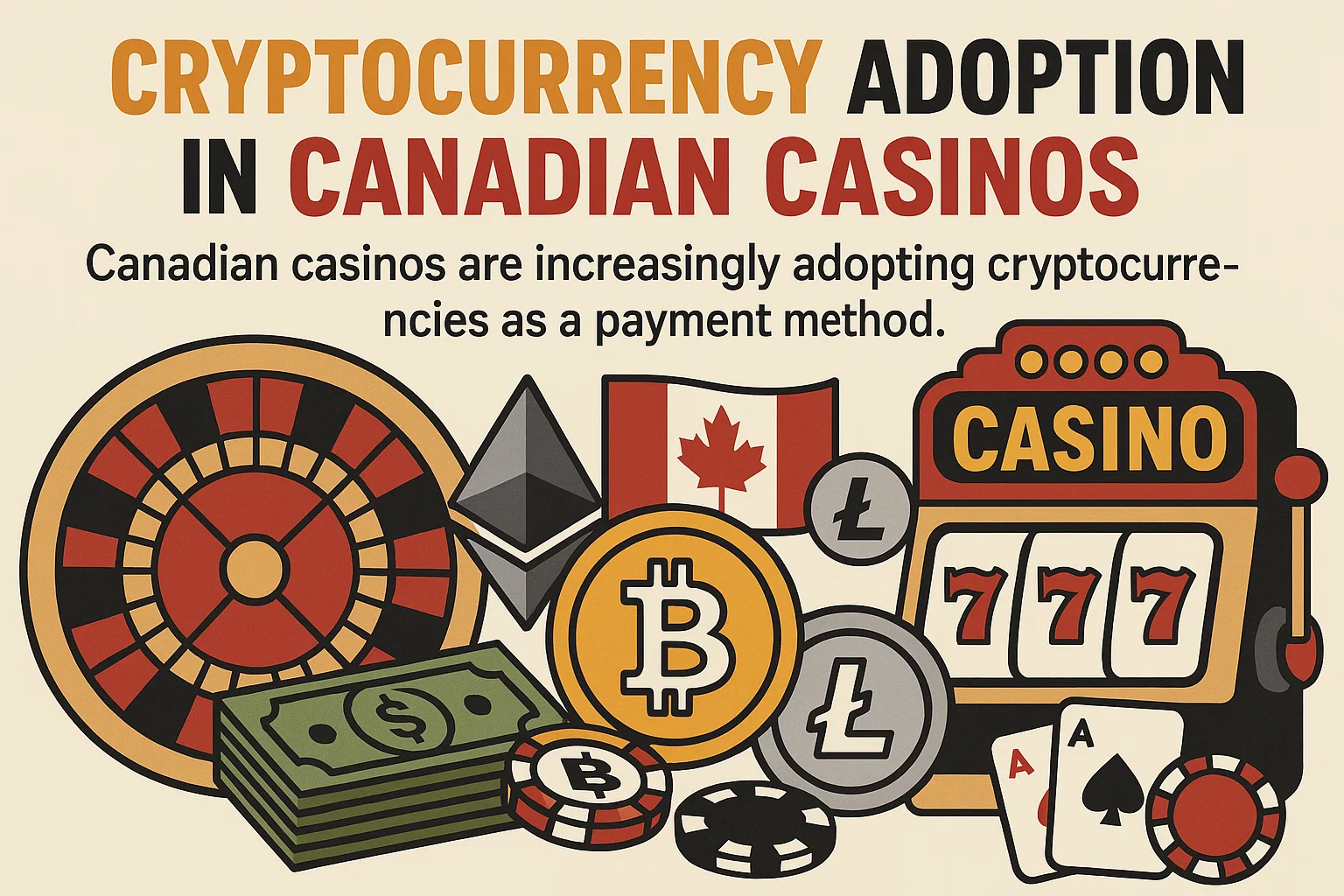The landscape of gambling in Canada is undergoing a revolutionary transformation as cryptocurrencies and blockchain technology reshape the way Canadians interact with digital casinos. This technological evolution promises enhanced security, transparency, and unprecedented gaming experiences that could redefine the entire industry. As traditional casino operators and regulators grapple with the emergence of digital currencies, the future of gambling in Canada appears increasingly intertwined with blockchain innovations and cryptocurrency adoption.
The integration of digital assets into Canadian gambling platforms represents more than just an upgrade in payment methods—it signifies a fundamental shift toward decentralized gaming ecosystems. With Bitcoin, Ethereum, and other cryptocurrencies gaining mainstream acceptance, Canadian gamblers are discovering new ways to enjoy their favorite games while benefiting from enhanced privacy, faster transactions, and reduced fees.
The Current State of Gambling in Canada
Gambling in Canada operates under a complex regulatory framework that varies significantly across provinces. Each provincial government maintains authority over gambling activities within its jurisdiction, resulting in a patchwork of regulations that casino operators must carefully navigate.
Traditional gambling venues have long dominated the Canadian market, from government-operated lotteries to licensed casinos and racetracks. However, the digital revolution has accelerated the shift toward online platforms, with Canadian players increasingly embracing internet-based gaming options.
The COVID-19 pandemic further accelerated this digital transformation, as physical casino closures drove millions of Canadians to explore online gambling alternatives. This shift created unprecedented opportunities for integrating cryptocurrency and developing blockchain-based gaming solutions.
Provincial Regulations and Digital Currency Adoption
Canadian provinces approach cryptocurrency gambling with varying degrees of openness and caution. While some jurisdictions embrace innovation, others maintain stricter oversight of digital asset integration in gaming platforms.
Ontario’s regulated online gambling market, launched in 2022, has become a testing ground for the adoption of cryptocurrency in licensed gaming environments. This progressive approach positions Ontario as a potential leader in crypto gambling regulation within Canada.
How Blockchain Technology is Revolutionizing Casino Operations
Blockchain technology offers unprecedented transparency and security for gambling in Canada, addressing long-standing concerns about fairness and trust in online gaming environments. Smart contracts enable provably fair gaming, where players can independently verify the randomness and fairness of game outcomes.
The immutable nature of blockchain records creates an auditable trail of all gaming transactions, ensuring regulatory compliance and building player confidence. This transparency extends to random number generation, payout calculations, and bonus distributions.
Smart Contracts and Provably Fair Gaming
Smart contracts eliminate the need for traditional intermediaries in gambling transactions, reducing costs and processing times while ensuring automatic execution of predetermined rules. These self-executing contracts ensure that winning bets are paid instantly, without requiring human intervention.
Provably fair algorithms allow players to verify game outcomes using cryptographic hashes, ensuring that neither the casino nor the player can manipulate results. This technology represents a significant advancement in building trust between operators and players in the Canadian gambling ecosystem.
Decentralized Autonomous Organizations (DAOs) in Gaming
Some forward-thinking platforms are exploring DAO structures for casino governance, allowing token holders to participate in decision-making processes regarding game development, revenue distribution, and platform upgrades.
Cryptocurrency Adoption in Canadian Casinos
The integration of cryptocurrencies into gambling on Canadian platforms offers numerous advantages for both operators and players. Digital currencies offer faster transaction processing, lower fees, and increased privacy compared to traditional banking methods.
Bitcoin remains the most widely accepted cryptocurrency in Canadian online casinos, followed by Ethereum, Litecoin, and various altcoins. Many platforms now offer dedicated crypto gaming sections with exclusive bonuses and promotions for digital currency users.
Benefits of Cryptocurrency Gaming
Cryptocurrency transactions typically process within minutes rather than the days required for traditional bank transfers. This speed enhancement significantly enhances the player experience, enabling rapid deposits and withdrawals.
Enhanced privacy protection appeals to players who prefer to keep their gambling activities confidential. Cryptocurrency transactions require minimal personal information, reducing identity theft risks and maintaining player anonymity.
Lower transaction fees benefit both players and operators, as cryptocurrency transfers often cost significantly less than fees associated with credit card processing or bank wires. These savings can be passed on to players through better odds or enhanced bonuses.
Popular Cryptocurrencies in Canadian Gambling
Bitcoin (BTC) leads cryptocurrency adoption in gambling in Canada platforms due to its established reputation and widespread acceptance. Many operators offer Bitcoin-exclusive games and enhanced rewards for users who hold Bitcoin.
Ethereum (ETH) powers numerous decentralized applications (dApps) that operate on smart contracts, providing transparent and autonomous gaming experiences.
Litecoin (LTC) offers faster transaction times than Bitcoin while maintaining similar security features, making it popular among frequent gamblers who value quick deposits and withdrawals.
Regulatory Challenges and Opportunities
The future of gambling in Canada hinges heavily on how regulators adapt to the integration of cryptocurrency and the adoption of blockchain technology. Current regulatory frameworks were designed for traditional fiat currency operations and require significant updates to accommodate digital assets.
Federal and provincial governments face the challenge of balancing the encouragement of innovation with consumer protection and anti-money laundering compliance. Clear regulatory guidelines could accelerate the adoption of cryptocurrency in licensed gambling operations.
Anti-Money Laundering (AML) Compliance
Cryptocurrency’s pseudonymous nature creates challenges for traditional AML compliance procedures. Gambling operators must implement robust Know Your Customer (KYC) protocols while maintaining the privacy benefits that attract crypto users.
Blockchain analytics tools are emerging to help operators track cryptocurrency flows and identify suspicious activities, ensuring compliance with Canadian financial regulations while preserving user privacy.
Consumer Protection Measures
Regulators must address unique risks associated with cryptocurrency gambling, including price volatility, wallet security, and the irreversible nature of blockchain transactions. Educational initiatives help players understand these risks and make informed decisions.
The Rise of NFTs in Casino Gaming
Non-Fungible Tokens (NFTs) represent an exciting frontier in the Canadian gaming industry, offering unique digital collectibles and gaming assets that players can own, trade, and utilize across multiple platforms.
Casino-themed NFTs include virtual slot machines, unique card decks, exclusive game access tokens, and collectible character avatars. These digital assets generate new revenue streams for operators while offering players tangible ownership of gaming elements.
Play-to-Earn Gaming Models
Some innovative platforms combine traditional gambling with play-to-earn mechanics, allowing players to earn valuable NFTs and cryptocurrency tokens through skilled gameplay and strategic decisions.
These models blur the lines between gambling and gaming, creating hybrid experiences that appeal to both traditional gamblers and cryptocurrency enthusiasts seeking earning opportunities.
Virtual Real Estate and Casino Metaverses
Blockchain-based virtual worlds are creating new opportunities for gambling in Canada through the development of virtual casinos. Players can purchase virtual real estate, build custom casinos, and earn revenue from other players’ activities.
Security Enhancements Through Blockchain
Blockchain technology addresses many security concerns that have historically plagued online gambling platforms. The decentralized nature of blockchain networks makes them resistant to single points of failure and cyber attacks.
Cryptographic security ensures that player funds and personal information remain protected through advanced encryption protocols. Multi-signature wallets offer an extra layer of security for large transactions and fund management.
Data Protection and Privacy
Blockchain-based casinos can operate with minimal personal data collection while still maintaining regulatory compliance. This approach significantly reduces the risk of data breaches that have affected traditional online casinos.
Zero-knowledge proof technologies enable identity verification without revealing sensitive personal information, thereby balancing regulatory requirements with privacy protection.
Economic Impact on the Canadian Gambling Industry
The integration of cryptocurrencies and blockchain technology is creating new economic opportunities within the Canadian gambling sector. Reduced transaction costs and improved efficiency allow operators to offer better odds and enhanced player rewards.
Cryptocurrency adoption attracts tech-savvy demographics who might not otherwise engage with traditional gambling platforms. This expansion of the player base contributes to industry growth and innovation.
Job Creation and Skill Development
The blockchain gambling sector requires specialized skills in cryptocurrency development, innovative contract programming, and blockchain security. This demand creates high-paying job opportunities in the Canadian technology sector.
Educational institutions are beginning to offer blockchain gaming courses, preparing the next generation of developers and operators for careers in this emerging field.
Investment and Venture Capital Interest
Canadian blockchain gambling startups are attracting significant investment from venture capital firms and cryptocurrency funds. This influx of capital accelerates innovation and platform development within the domestic market.
Future Trends and Predictions for Gambling in Canada
The future of gambling in Canada is likely to see the continued integration of emerging technologies, including artificial intelligence, virtual reality, and advanced blockchain protocols. These innovations will create more immersive and personalized gaming experiences.
Central Bank Digital Currencies (CBDCs) may eventually integrate with gambling platforms, offering government-backed digital payment options that combine the benefits of cryptocurrency with the stability of traditional currency.
Artificial Intelligence Integration
AI-powered analytics will enhance responsible gambling measures by identifying problematic betting patterns and automatically implementing protective interventions. This technology helps strike a balance between player entertainment and harm prevention.
Personalized gaming experiences, driven by AI algorithms, will tailor game recommendations, bonuses, and promotional offers to individual player preferences and behaviors.
Virtual and Augmented Reality Casinos
VR and AR technologies will create immersive casino environments that rival physical gambling venues while maintaining the convenience of online access. These platforms will support cryptocurrency transactions and blockchain-based gaming mechanics.
Mobile Gaming and Cryptocurrency Integration
Mobile platforms represent the primary growth vector for gambling in Canada, with cryptocurrency integration making mobile gaming more accessible and convenient than ever before.
Dedicated mobile wallets and gaming apps provide seamless cryptocurrency transaction experiences optimized for smartphone and tablet users. These platforms often offer exclusive mobile bonuses and promotions.
Lightning Network and Instant Transactions
Bitcoin’s Lightning Network enables instant, low-cost transactions, making it ideal for mobile gaming scenarios. This technology eliminates the traditional delays associated with cryptocurrency gambling.
Other cryptocurrencies are developing similar layer-two solutions to improve transaction speed and reduce costs for mobile gaming applications.
Responsible Gambling in the Crypto Era
The anonymity and ease of cryptocurrency transactions create new challenges for responsible gambling initiatives. Operators must implement innovative approaches to identify and assist players experiencing gambling problems.
A blockchain-based self-exclusion program to restrict access to gambling platforms through immutable smart contracts. These systems provide more robust protection than traditional database-driven exclusion methods.
Community Support and Education
Educational resources help players understand both the risks of gambling and the security practices associated with cryptocurrency. This dual focus ensures that players can enjoy crypto gambling safely and responsibly.
Peer support networks within cryptocurrency communities provide additional layers of assistance for players seeking help with gambling problems.
Conclusion
The future of gambling in Canada is inextricably linked to the adoption of cryptocurrency and blockchain innovation. As technology continues to evolve, Canadian players can expect more secure, transparent, and engaging gambling experiences powered by digital assets.
Success in this new landscape requires collaboration between operators, regulators, and technology providers to create frameworks that protect consumers while fostering innovation. The provinces that thoughtfully embrace these technologies will likely lead the next generation of gambling development in Canada.



